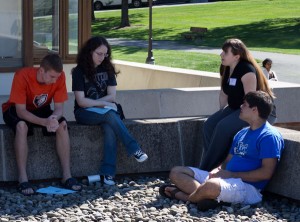President Tom Rochon opened the First-Year Reading Initiative ceremony Tuesday by posing a question to an audience of 1,570 freshmen students.

“You will all be here on an undergraduate journey for the next four years,” he said. “What are you going to make of that journey?”
The First-Year Reading Initiative book of choice was David Malouf’s Trojan-War-based novel “Ransom,” the story of King Priam of Troy’s attempted journey to ransom his son Hector’s body after the Greek warrior Achilles defeats Hector in battle. Achilles drags the body around the city in retribution for his friend Patroclus, who died at Hector’s hand.
The theme of life’s journey was reflected throughout the event and in small discussions.
Attendees of previous FYRI programs would have found themselves in a different atmosphere at this year’s event. The FYRI coordinators organized student seating using the last name of every small group discussion facilitator, one step of many that improved the proceedings.
Jim Swafford, associate professor of English and new coordinator of FYRI, was the primary speaker during the event.
Swafford said the board would have to assess the program for its potentials and improve it based on the results.
“We’ve tried to make information about the book more available to students in the summer and tried to make going to these small group discussions seem a kind of natural thing to do, rather than optional,” Swafford said.
With the seating plan in place — something he said was implemented to control the previous “organized chaos” of the event — nearly every student successfully ended up in a small group discussing the novel.
Swafford also presented “Ransom” to every orientation session this summer. He had freshmen look at a few passages in an attempt to get them interested in the book.
“It’s a book that sells itself,” he said. “It’s both emotionally powerful and intellectually stimulating.”
When it came to students bringing the same enthusiasm for “Ransom” to small group discussions, however, they seemed more wary of the novel than Swafford.
“It was way over my head,” freshman Rachel Darcy said. “There are some interesting topics in it, but the book was kind of hard for me to finish.”
Freshman Brandon Glass was direct about how he approached the book.
“People told me it was a lot like the movie ‘Troy,’ so I just watched that,” he said.
Some students, however, seemed to equate their transition to college to that of Priam’s journey.
In a small group discussion, freshman Marc Gonzalez said the idea of being on his own in college was an overwhelming journey.
“Because we’re moving into college, we’re going to entirely new places with entirely different people,” he said. “We’re losing our support base and we don’t have parents to do our laundry or give us money. So we have to take responsibility for what we do now.”
In the same group, Glass said the college experience was a journey worth taking.
“It’s all about the journey,” he said. “It’s a nervous excitement because you’re excited to go on with your life, but then you’re nervous of almost a fear of the unknown.”
Swafford said he is also excited for the future of the FYRI program. The next book will not be chosen until next summer, before freshmen orientation begins.
“The selection committee has always tried to choose something that addresses, one way or another, that basic question of who we are as human beings and what our aspirations are,” he said.
Swafford said the book is not just about growing up and away from tradition, but also being innovative in an effort to become more productive.
When Theresa Radley, discussion facilitator and assistant director of student involvement, asked students what the next step on their journey to personal growth was, the response was a bit less profound.
“Googling how to do my own laundry,” Glass said. “And just finding my way to classes Wednesday.”







